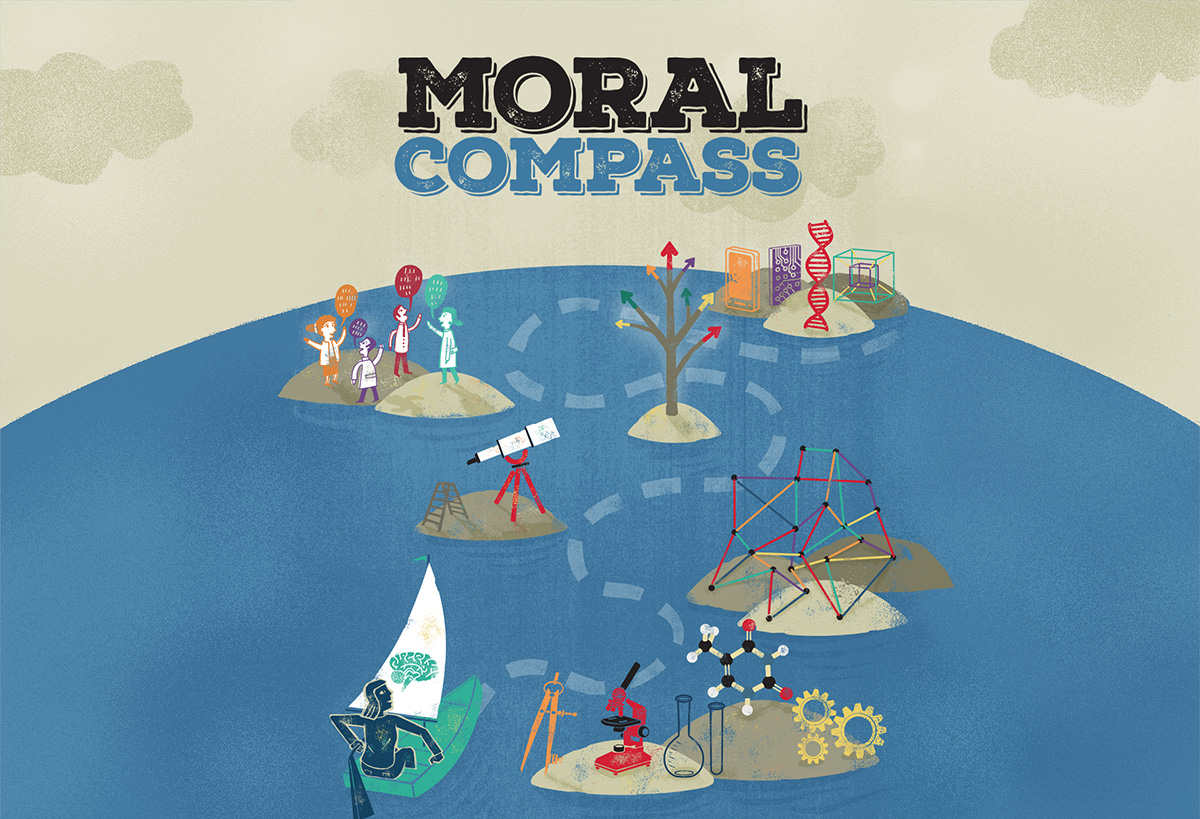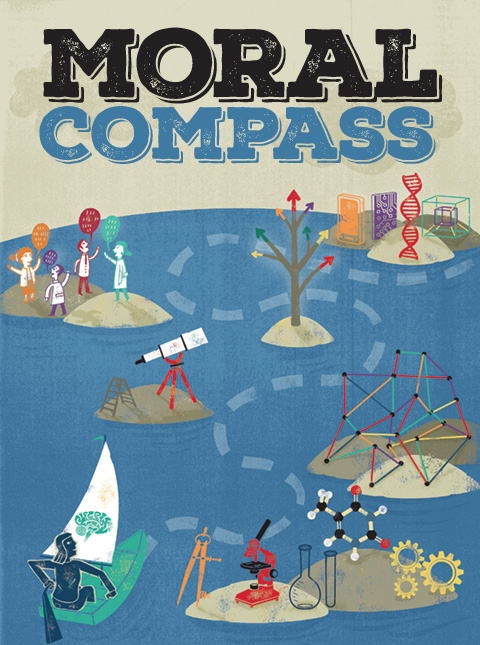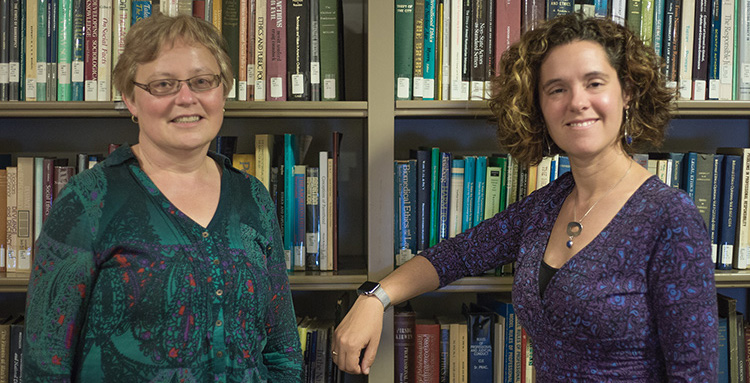

More than 40 years after its founding, Illinois Tech's Center for the Study of Ethics in the Professions continues to provide guidance and leadership in education and research.
Michael Davis, Illinois Tech professor of philosophy, considers today’s super-sized America before answering the question: Does our country need ethics guidance now more than ever before?
“We live within an enormously complicated system—there are 300 million of us whereas in 1900 there were 75 million. Corporations are much bigger and divided up in ways that are different than they used to be. Products are more sophisticated. And much of what we do now is invisible,” he explains, sharing an anecdote about his first job hand-developing photographs, nearly five decades ago. “Most of what I used to do is now inside this, along with the camera itself,” he adds, pointing to his smart phone. “Most of what makes this such a valuable thing is in the minds of the people who laid out the design. If you have so much invisible quality, you’re really more dependent upon people than you used to be. And if we are, then their ethics is more important.”
Equally invisible to the average person and perhaps less accessible than the concept of a smart phone’s capabilities is genetic editing via CRISPR technology, a method that cuts and replaces DNA at precise locations in a cell. In August a study was published in the journal Nature by a team of researchers from the United States, China, and South Korea who corrected the mutated gene behind the disease hypertrophic cardiomyopathy in human embryos. This scientific breakthrough raised numerous ethical concerns on the already controversial subject of human genetic engineering. The ethical implications of such emerging technologies comprise an area in which the Center for the Study of Ethics in the Professions (CSEP) at Illinois Tech and faculty associates are working to establish ethical guidelines.
Bioethicist Elisabeth Hildt heads the center, which has been a touchstone for many in the ethics community-at-large since its establishment in 1976. Former head of the Research Group on Neuroethics/Neurophilosophy at the Johannes Gutenberg University Mainz (Germany), Hildt says that CSEP’s Ethics Code Collection, which Librarian and Information Researcher Kelly Laas compiled from some 1,500 organizations, is an especially valuable resource for today’s ethical challenges. It is the largest database of individual codes of ethics and guidelines in the world.
“Ethics codes and guidelines offer a huge opportunity to shape technology development, not just to recommend individual or company behavior. They can help to provide direction on whether or not humans should be cloned or on the use of CRISPR and similar technologies, where modifications can be made to the genetic endowment of an organism,” says Hildt. “What does it mean to have something implanted in your brain? Is there a way to manipulate people through it? What do people think about having different types of technology in their bodies? Do we really want this?”
Shortly after her arrival on campus in 2014, Hildt and postdoctoral student Geoff Holtzman began a two-year project funded by the Swiss Cogito Foundation that examined the ways that neuroscience and ethics intersect. Last year they organized the symposium “Does Neuroscience Have Normative Implications?” drawing experts from around the country. And earlier this year, The Human Sciences after the Decade of the Brain, a book that Hildt co-edited, was published.
“We’ve been gratified that the center’s approach has been recognized as one of the best practices in ethics education.”
—Kelly Laas
Engineering, genetic or otherwise, has been a mainstay of the Ethics Center, in particular since 1987, when the late Vivian Weil came on board as director. An Illinois Tech philosophy faculty member for more than 40 years, Weil, along with Davis and Robert Ladenson, emeritus faculty associate, initiated a CSEP landmark program that many colleges and universities around the country have copied: Ethics Across the Curriculum.
“One thing that made the center work is that we focused on issues that the university was very much interested in, like engineering ethics,” Davis, CSEP senior fellow, explains. “The reason we did Ethics Across the Curriculum was that a couple of mechanical engineering faculty wanted to integrate ethics into their classes. We had nothing that was suitable for them so we spent a year developing materials they could use.”
Initially taught to Illinois Tech faculty, the National Science Foundation (NSF)-funded curriculum was soon offered to faculty from other institutions who spent two weeks during the summer on Mies Campus learning how to integrate ethics into their technical courses. Davis says that each participant came away with either a case study, module, or lesson plan to use in the classroom as well as to share with their fellow faculty. Before it concluded in 2016, the program was incorporated into ethics teaching by domestic and international schools alike.
Laas says that a partial list of these schools would include Purdue University, the Colorado School of Mines, Tokyo Institute of Technology, and the University of Illinois at Chicago. Laas, who has done drop-in ethics instruction for Lewis College of Human Sciences, Armour College of Engineering, and the College of Science, says that the center’s goal has always been to have the faculty commit to teaching ethics.
“Although dedicated ethics courses are offered at the university (engineering ethics, architectural ethics, and business ethics), the center prefers a true integration into most any course within any discipline,” she says. “Also, the NSF is no longer offering funding for stand-alone ethics courses; it believes that people need to look at the culture of institutions and the culture of labs, and integrate ethics into the research being done. We’ve been gratified that the center’s approach has been recognized as one of the best practices in ethics education.”

Photo: Scott Benbrook
Illustrations: Brucie Rosch
Laas and Hildt, along with Illinois Tech Clinical Associate Professor of Innovation Christine Miller and Eric Brey, University of Texas at San Antonio professor and chair of biomedical engineering, are collaborating on an NSF-funded project to further refine ethics education within the university and, over time, to initiate a change in ethical behavior within science, technology, engineering, and mathematics (STEM) departments and laboratories at Illinois Tech and beyond. The team’s “Building a Culture of Responsible Research and Practice in STEM” project aims to develop guidelines for identifying ethical problems and navigating the decision-making process within a STEM department or lab. Select doctoral students in biology, physics, biomedical engineering, and electrochemical engineering are conducting interviews with undergraduates, peers, and staff to determine areas of ethical concern and to develop laboratory-specific ethical guidelines.
“It’s often not that easy to teach ethics in an efficient way, so we began thinking of new approaches such as teaching out of the classroom and directly within the context of the research lab, where people are confronted by ethics issues,” explains Hildt, adding that the ethics center team spent the summer conducting information-gathering surveys. “The students will use ethics codes from their fields, many collected by the center, as potential resources. In most cases, there’s not much information regarding labs. Once guideline drafts are completed, the students will share them with faculty, staff, and colleagues within their respective departments.”
Brey says the hope is that by leading much of the project, the students will learn to develop and nurture a mindset, rather than just try to manage situations of inappropriate behavior after the fact.
“Ethical issues can include how faculty should interact with students and mentor them and how researchers can make decisions about understanding their data and promoting their data in a way that is responsible, that can best inform people, and that doesn’t direct people in the wrong way,” says Brey. “How confident do we need to be? No one person can know everything.”
Illinois Tech students also have two extracurricular opportunities to explore ethics topics. The ethics club, QED: The Ethical Debaters, meets weekly over lunch during the academic year to debate ethics issues in the news. The annual Intercollegiate Ethics Bowl, held annually since its inception at Illinois Tech in 1993, is a nationwide competition that features two teams of three to five undergraduates who answer questions on a wide variety of ethics issues and debate their responses with the opposing team. A panel of judges determines the winning team using detailed evaluation criteria.
Reno Fera-Ducatt Waswil (PHYS ’17), who teaches high school students SAT test-taking strategies for The Princeton Review, was a member of the regional 2016–17 Ethics Bowl team and former QED president. He reflects on how his experiences served to make him a more effective decision-maker today.
“There are three main areas I can point to in which involvement in QED and the Ethics Bowl has helped me—in recognizing the patterns of complex ethical issues; in making concrete conclusions based on the population of information and evidence available; and in justifying these considerate analyses and conclusions publicly and being able to respond to an array of critique on them,” he says, adding that his ethics experiences have helped him to make a wide range of lifestyle improvements from refining his job interviewing techniques to relating better to his audience when making presentations to even developing empathetic characters as an aspiring creative writer.
Attorney Gretchen A. Winter, executive director of the Center for Professional Responsibility in Business and Society at the University of Illinois at Urbana-Champaign College of Business, says that while the Ethics Bowl has given many students the chance to discuss ethical issues in a variety of contexts, it is only one facet of a center that she made her first stop when seeking ethics resources and guidance on ethics center design and management after being named to her current position.
“The center’s leadership in defining and sharing ways to apply professional ethics standards in a wide range of circumstances has been a valuable source of guidance to faculty, students, and practitioners,” she says. “The Ethics Center has been at the cutting edge of professional ethics since Vivian Weil took the helm many years ago. Under Elisabeth’s direction the leadership and guidance continues—and the community of academically based ethics centers continues to grow.”